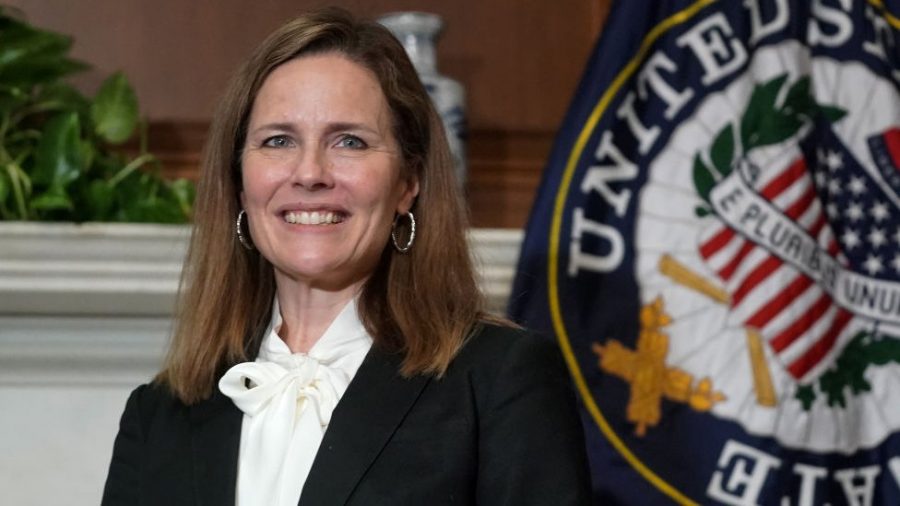White privilege strikes again
United States Supreme Court Nominee Amy Coney Barrett has been selected by President Donald J. Trump to replace Justice Ruth Bader Ginsburg.
October 31, 2020
Joining the Supreme Court amid a global pandemic in one of the smoothest confirmations we have ever seen, Amy Coney Barrett is the embodiment of white mediocrity being rewarded yet again. With the opportunity to serve more than three decades on the bench, the 48-year-old was pushed through the Republican-controlled Senate within a month. Used as a replacement for the late Ruth Bader Ginsburg, Barrett’s appointment to the Supreme Court is a slap in the face to Ginsburg’s legacy and a perfect example of U.S. politics.
Before her untimely death in September, Ginsburg gave her final regards in terms of her expected retirement, “My most fervent wish is that I will not be replaced until a new president is installed.” Understanding the importance of her seat as a Supreme Court justice and the election underway, Ginsburg left her seat in the hands of the American people. By not appointing another justice to the court until a new president was installed, the American people essentially were given the power to decide the future they wanted to live in. Unfortunately, her wish fell on deaf ears. President Donald Trump wasted no time rushing Barrett through the confirmation process. Hoping to limit the American people’s backlash by choosing a woman, it seemed clear that Trump and the Republican party were more interested in Barrett’s gender than her qualifications.
With 15 years of teaching experience from her alma mater Notre Dame Law School, it is no doubt that Barrett is an intelligent woman. Comparing herself to the late Justice Antonin Scalia, whom she calls a mentor, Barrett has stated that she will apply the law as written following Scalia’s originalist judicial philosophy. However, unlike Scalia, Barrett does not have over 30 years of judicial experience. To be frank, she has spent less time being a judge than I have spent in college. Though her background is limited, it can be argued that judicial experience is not the only thing that makes a Supreme Court Justice successful. Other qualities such as arguing a case before the Supreme Court, arguing appeals, and trying cases have also assisted with justice’s success. All of which Barrett has not done according to Motherjones.com. Moreover, outside of this, she also had never been a judge before 2017. She has also never worked in government as a prosecutor, defense lawyer, solicitor general, attorney general, or served as counsel to a legislative body, all of which are seen on the resumes of most supreme court nominees—proving that despite her receiving her Juris Doctorate from Notre Dame, she actually never put it to use.
Fortunately, to make up for the glaring holes in her resume, Barrett briefly worked in the private sector. However, much like the rest of her resume, her time as an associate at Miller Cassidy and Baker Botts was so unimpressive even she could not recall any significant litigated matters she handled personally. When asked by the Senate Judiciary Committee to describe the 10 most significant litigated matters she handled personally, she stated that, “I recall only three significant litigated matters that I personally handled.” Then, when asked to describe her efforts in these matters in detail, she explained how she merely contacted lawyers and searched legal databases, further proving her lack of practice experience in handling litigated matters.
Despite knowing her lack of experience, it was clear that her Christian conservative values served as the main purpose Trump chose her to replace Ginsburg. At her alma mater Notre Dame, Barrett was a member of the University Faculty for Life. In 2006, she signed her name to a newspaper ad sponsored by an anti-abortion group, stating that she opposed “abortion on demand” and defended “the right to life from fertilization to the end of natural life,” as reported by the Associated Press. Ultimately, despite her lack of experience, she was chosen as a Supreme Court justice to strengthen the republican attack on abortion rights in this country, which is expected in Trump’s America. He is willing to jeopardize decades of progression all to overturn one case, Roe v. Wade.
As much as the general public feigns outrage to many of Trump’s actions, he is simply a more direct example of how this country works. If you are white, wealthy, and well connected, you have access to amenities that others dream of. In his case, he snagged the position as president of the free world who’s qualifications were only being a shady businessman. In Barrett’s case, she secured a spot on the highest court in the land despite simply being a teacher. White privilege strikes again.







